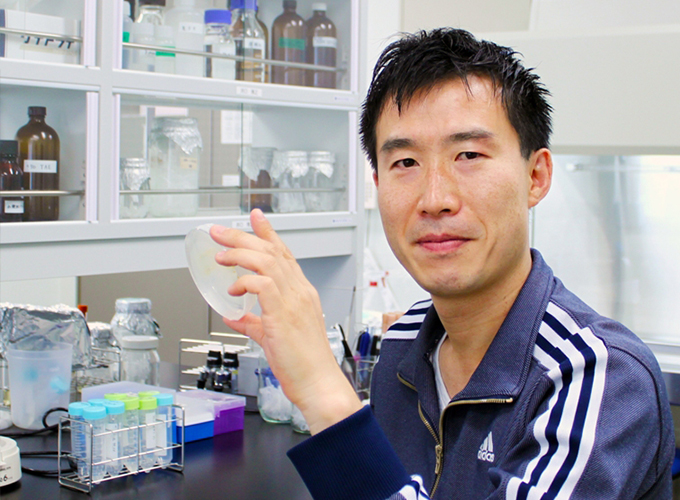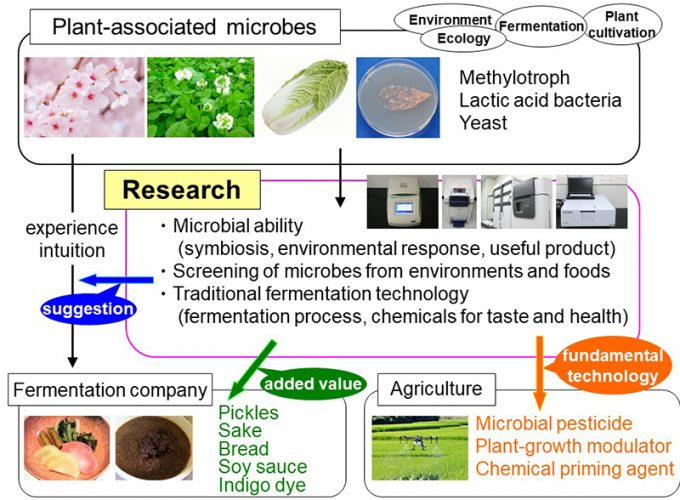Hiroyuki Iguchi
Associate Professor, Master of Applied Microbiology, Ph.D. in Agriculture
- iguchi.hiroyuki

- Areas of Research
- Applied Microbiology, Environmental Microbiology, Fermentation Science
- Profile
- Research
-
Dr. Hiroyuki Iguchi received his Master’s Degree in Applied Microbiology from the Graduate School of Engineering at Osaka University and earned his Ph.D. from the Graduate School of Agriculture at Kyoto University. Upon completing his master’s course, he worked at a private enterprise where he developed supplements and food for the elderly. He is currently appointed as an associate professor at KUAS, where he teaches microbiology subjects including zymurgy and food hygienics.
On his days off, Dr. Iguchi likes to visit cities and countryside towns to enjoy delicious cuisine and Japanese hot springs. His recommendation for domestic travel is Awaji Island in Hyogo Prefecture, where one can enjoy beautiful nature and fresh seafood, vegetable, and fruits. He likes to play baseball and go jogging to stay in shape.
-
The phyllosphere (aerial part of plants such as leaves and stems) is a hostile environment for habited microbes since it is exposed to sunlight, fluctuations of temperature, and humidity and presents limited nutrients. To survive and/or grow, these microbes are expected to evolve and acquire specific abilities for stress resistance, metabolism, and environmental response. Some phyllosphere microbes represent the symbiotic interactions with plants: support of nutrition acquisition, modulation of plant growth through plant hormone production, and stimulation of plant immunity, all of which are useful for plant cultivation. Although some phyllosphere microbes are pathogenic, other phyllosphere microbes usually antagonize pathogenic activity. Furthermore, microbes associated with plant ingredients can work in fermenting foods such as pickles and wine. Thus, the phyllosphere microbes are important not only for the knowledge of plant microbiology but for application in plant cultivation and food processing (fermentation).
One focus in Dr. Iguchi’s laboratory is Methylobacterium, which is a methanol-utilizing bacteria (methylotroph) and represents the primary population in the phyllosphere of some plant species. He studies functions of the light-responsive factors such as photoreceptors, chlorophyll, and rhodopsin to gain understanding of the bacteria’s ability to adapt to the phyllosphere environments. Interestingly, this bacterium has the circadian clock gene homolog (kaiC). Dr. Iguchi’s team has reported that this gene is involved in the regulation of stress resistance and is necessary for plant colonization. They currently analyze the regulatory mechanism and functions in the phyllosphere under light and dark cycles.
Dr. Iguchi also researches the growth ability of lactic acid bacteria (LAB) on plants and their application to microbial pesticides for vegetable cultivation. LAB can be isolated from natural plants, vegetables, and fermented foods. Dr. Iguchi’s team now examines the growth, metabolites, and gene expression of LAB in plants. They also study the fermentation process and technique of regional fermentation products such as pickles, soy sauce, and indigo dye. Japan has several important traditional fermentation techniques, but many of them are becoming obsolete due to new scientific technology and a lack of successors. Dr. Iguchi’s team aims to reveal the excellence of traditional techniques and improve the evaluation of the products.
